
Biology
202
Neurobiology and Behavior
Spring 2002


| Biology
202 | 
|
Who are we?
| Biology major? | 17 |
| Psychology major? | 8 |
| NBS concentrator? | 11 |
| Other majors? | 16. phil, math, english, sociology, pol sci, art history |
| Undecided | 8 |
| Interested in biology/nervous system? | 35 |
| Interested in psychology/behavior? | 35 |
| Interested in philosophy/nature of reality/human experience? | 21 |
Disturbed by/want to understand headlines about research on nervous
system/behavior?
| 27 |
| Want to understand who you are? why you/other people behave the way you/they do? What you/they can do about it? | 25 |
| Other? |
Neurobiology and BEHAVIOR ... what is "behavior"?
| characteristic actions, reactions to stimuli, walking/chewing, etc. | patern of actions and reactions | do you have choices or are they "wired" | thinking, need to include "non-observable" things, emotions, hormone levels, stress, intuition, "mental condition", previous experience, instincts, current circumstances. social interactions/style, illness, intentions/expectations/goals/purposes, sleep, culture, drugs, belief system, age, sex, sense of identity/self, creativity, playfulness |
NEUROBIOLOGY and behavior ... Neurobiology = study of the nervous system ... what is the "nervous system"?

| Image by Andreas Vesalius (1514-1564), contemporary of Copernicus, suggested (less than 500 years ago) that nervous system rather than heart was origin of behavior (see Milestones in Neuroscience Research for a time line extending from 4,000 B.C.). | 
| Image by Rene Descartes (1596-1650). Set framework for several centuries (and continuing) discussion: mind and body distinct things or same thing? |
Nervous system is material object, part of body, can be touched, manipulated, measured. What IS relationship between mind/body? between mind/brain? between brain (nervous system) and behavior? | |||
| Agree with Dickinson et al. | 24 |
| Disagree with Dickinson et al. | 9 |
| Unsure/fence-sitting | 12 |
Brain = behavior?, from a "scientific" approach:
Issue is
not "Truth" but whether it is a good "summary of observations", "working
hypothesis", helps to get it continually "less
wrong" ...
Course is about the "trend of the evidence":
Starting with what one thinks .... and getting used to/seeing the advantages of being wrong
How DOES the nervous system work? ... (What must it be like if Emily et al
right)? ...
and a starting case, the cricket (Bentley and
Hoy, 1974)
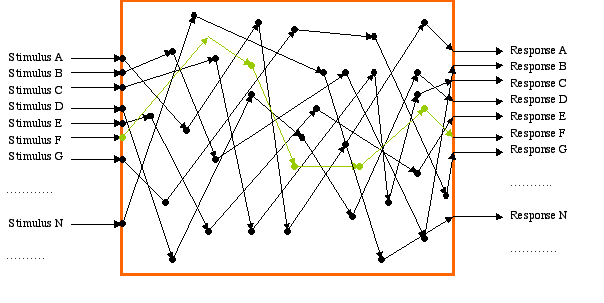
| Virtues
|
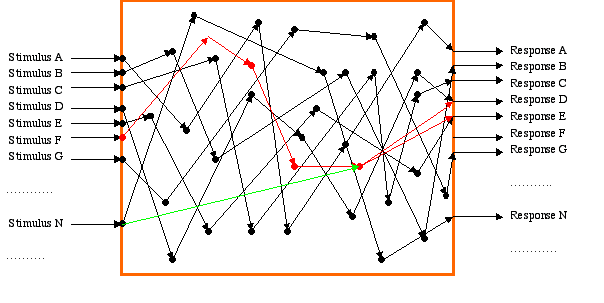
| Virtues
|
A rethinking - boxes in boxes
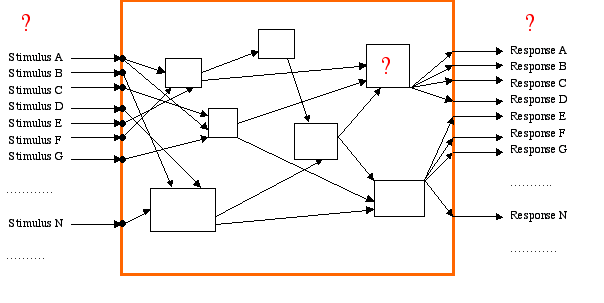
| Virtues
|
Facing up to the stereotopy, stimulus-response problem ... freeing the box from the outside world, adding autonomy
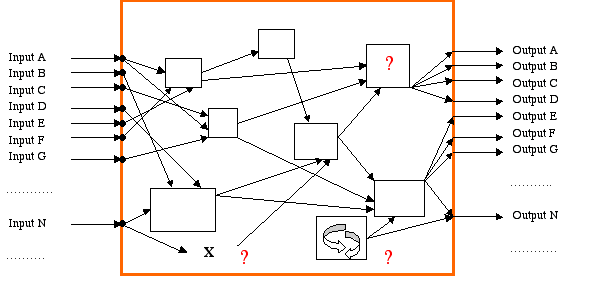
| Virtues
|
Some issues ...
|

| 
|
| photo from Kemali and Braitenberg, Atlas of the Frog Brain, Springer-Verlag, 1969 |
Each box in turn (somewhat arbitrarily) subdividable into smaller boxes (with some differences among vertebrates, to return to)
And those ... yes, "its boxes all the way down"
we don't really know how to define the "boxes" that make up the nervous system. Additionally, you have to look at the question of whether the nervous system has borders and the implications that this has for the brain=behavior idea. .... Amy Cunningham ... (today)
How does the brain understand what exactly these inputs are? How does the brain and nervous system know exactly what to do? Wouldn't there have to be other outside behaviors and responses coming in? .... Rebecca Roth ... (today) From our class discussion,I was feeling the model about boxes within boxes within boxes. It kind of reminded me of when I would ask my parents a question whne I was younger. They would answer it but then it would cause me to question the answer and so on. .... Ricky Tripp ... (today and tomorrow and tomorrow and ...) Perhaps, although the brain tissues at a high magnification do look similar to each other, it is the way the brain tissue interacts with each other in general that causes the differentiation of species' behavior. For example, if you had two buckets of Lego with the same exact pieces in each bucket, you could find more than one way to use them. You could make a ship, or a plane; or maybe even a building or a house. But even though these structures were made from the exact same pieces, they ARE different structures. Perhaps this is why although the brain tissues are similar at a high magnification, the species still behave differently from each other. .... Balpreeet Bhogal ... (soon) If the presence of a neocortex suggests more complex thought process and more emotional attachments, then differences in brain structure influencing differences in behavior supports that brain = behavior. .... Shannon Lee ... (not too long) at what point in this process do living creatures (no matter how sophisticated) make decisions? What happens in the tiniest box that allows for the output not to need any input? How can it generate input from within? .... Beverly Weiss ... (not too long) It might then be interpreted that the degree of processing and the sophistication of the corresponding output is what is measured to determine the highest level of function. Yet, what accounts for emotion? How much does instinct or genetic disposition contribute to our behavior? .... Kelli Deering ... (in a bit) Back to the animals. if we have these kinds of boxes in our brains which incorporate thinking, then do animals think too? .... C. Barnes ... (in a bit) maybe there is an outside blueprint that accounts for the building parts AND for the various differences between you and me...or us and them. .... Biz Martin ... (in a bit) "Boxes all the way down": using the smallest box, the neuron, to create structures of increasing complexity and inifinite variety offers a pleasantly [and deceptively?] simple solution to the brain = behavior question, or at least the subquestion: if the brain = behavior, how do we account for the infinite variety of behavior? By an infinite variety of brains. ... The boxes all the way down model, however, does not offer [to me] as satisfying an explanation for the Harvard Rule of Animal Behavior. We can account for any living organism's unpredictable behavior by attributing that apparent unpredictability to our ignorance. If we knew enough about the organism's brain, and could control all external input, perhaps the behavior would be entirely predictable. Neuroanatomy is destiny? ... Hilary Hochman ... (yes, we'll get there) |
Invertebrate nervous systems also have neurons, but differently arranged - makes sense?
Neuron as common, smallest box and as input/output element, connected to other boxes
Can use to show that larger boxes interconnected, in relatively specific ways (anatomical specificity) and to rigorously specify "input" and "outputs" of largest box ... nervous system itself
So ... at least parts of our box within box model real ...
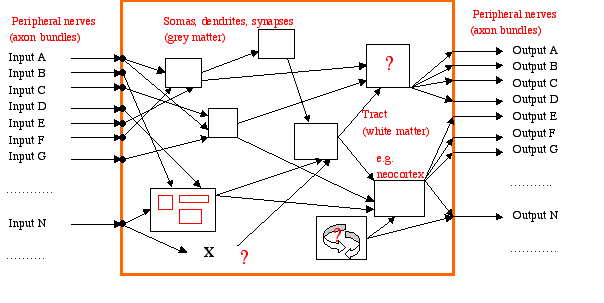
| Additions:
|
Outputs - topographic organization - anatomical specificity
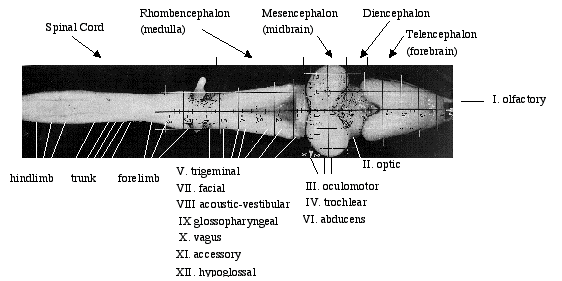
| For additional information: |
Usefulness of the interconnected box model and ... another box?
Observations "surprising", but have to be accepted - Issue is "how to make sense of them"
Two kinds of behavior ("reflex" versus something-else) intuition probably not useful
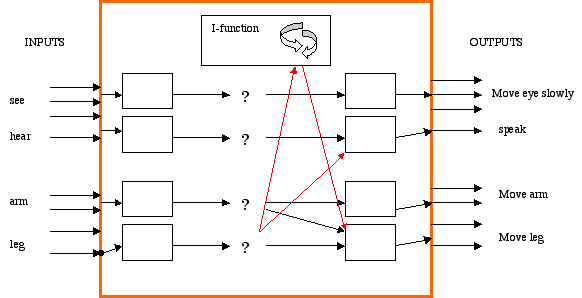
| Ascending somatosensory pathways |
First web paper due 26 February
The Christopher Reeves discussion ...
Action potential
Resting potential
Receptor/generator potential
Synaptic potential
Action potential - longitudinal battery which appears/disappears successively at successive points along an axon ("travels" at finite speed), "all or nothing" transient (millisecond range) event
To understand action potential, need first to understand resting potential - transverse battery, continuously present, with potential for continuous variation
Lightening and thunder, network specificity, how gets made?, how changes?, clones? |
Have resting potential (transverse battery) and core of explanation of action potential: adjacent membrane regions with different transverse batteries (because of different selective permeabilities) - Issue is how to get it to MOVE, with finite velocity?
And the big question ... can signals start in the middle of the box?
Have action potential, resting potential, spontaneous activity, based on ...
Input (sensory) signals - an example
Two important ideas from last week:
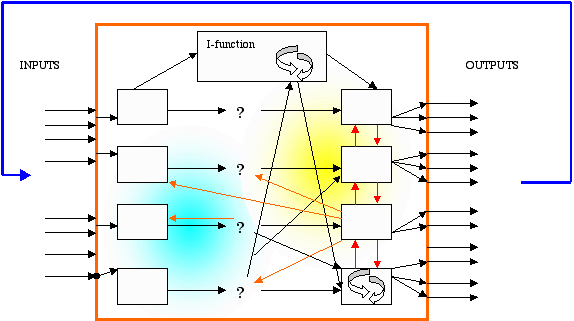
Have done neurons, their properties. For more/different (quick sample):
Basic idea: neurons substantially similar, integrate currents due to permeability changes, send signals (action potentials, currents, chemicals) on to other neurons ... Is that ENOUGH? --------> Forum
|
Personally, I believe that there has to be something more that accounts for
behavior. What we have discussed seems complicated enough, but it's only half way
through the semester-there has to be something more! We haven't really discussed
the idea of experiences and thought yet. Perhaps there is something more than what
we have discussed that contributes to the that. ,,, Balpreet
I think we also need to talk more about the effecr of the environment and the information that we receive through our senses and how that affects behavior. ... Amy I want to know how the brain stores information. How do these neurons work together so that information is learned? What differences lie within individuals that allow a greater or lesser capacity for knowledge?? When I get a random thought, is it the result of a spontaneous action potential, or is it a pattern of neurons working together? I really want to understand how the neuron correlates with behavior. Because we can not presume that there is anything else there but cells, it must be the patterns of these cells that account for the differences in brain and behavior amongst different species and different individuals. ... Aly There has to be something other than just neurons and the connections that equal behavior. How can the brain create or equal behavior when we can will ourselves to think and act? Neurons correlate our thinking. It does not mean that the neurons created the thought, or the behavior. Think about biting into a sour lemon. Mm, not a pleasant thought, unless you actually like the pure taste. Even if you do like it, your mind creates the thought that gives one a positive or negative feeling. First we think, then we feel. It just happens that the neurons and chemicals go along with it. On the other hand, what about chemical imbalances? ... Cass We talked about how neurons can start an action potential in the middle of a neuron, which is helpful. This provides a reason for how people can simply think of something without having some sort of stimuli. A neuron in the brain (most likely in the cerebrum)can create a cascade of action potentials which will be expressed as an idea. I'm not sure how this can be done. One must draw upon a very large number of neurons in order to even remember where I put my keys this morning. Not only do I have to think about my actions from the morning, but I have to express everything in terms of a language that I can understand -- the narrator inside our heads. This makes me very curious about language. ... Michelle Neurons all the way down [or for that matter, changes in membrane permeability all the way across] is as dissatisfying as turtles all the way down. On what is that first turtle standing anyway? What causes the first neuron to fire -- or are we positing infinity inside each nervous system? ... What does thinking look like -- is it a physical act? And how do my thoughts cause membrane permeabilities to change and action potentials to travel, when I can not will this to happen? I wrote my last paper thinking that all the fuss about the mind-body problem was just an outdated philosophers' full employment act, but now the [relatively] simple act of trying to post this week's essay, after the class discussions about neurons and action potential, makes it seem more troubling than before. ... Hilary it is difficult to see how we can understand behavior and memory when all we are allowed to work with are neurons. I recognize the argument that a complex system can result from a seemingly simplistic basis, but I still have trouble understanding exactly how this happens in the human brain. ... Gavin I think that we need to discuss the role of experience in the brain = behavior argument more, but I think that there definitely could be a way to incorporate it into our theory without the model completely breaking down. ... Mary
What happened to experience, soul and emotions? Itís one thing to know that signals travel along a neuron through current flow caused by specific physical events, and quite another to accept that these signals add up to the whole consciousness of a person. Rather like we learn about atoms in grade school, and then must come to grips with the fact that only atoms make up a mountain, it takes a great deal of getting used to. It helps if one can look at some rocks: some stepping stones from the tiniest bit to the whole. ... Sarah |
Have general ideas of units, rules of construction ... let's start building, see what we can get to connect the two levels?
Begin (non-traditionally) with output - "action"
Action = "motor symphony"
Accounting for motor symphony
| 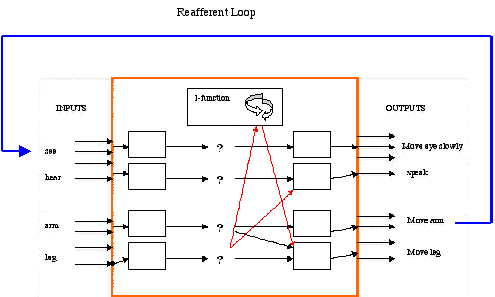
|
Looking more closely at the "central pattern generation" hypothesis
Reafferent loop - exteroreceptors and proprioceptors7 March
Looking for some "rocks" - between neurons and behavior
Action (observable) = motor symphony (spatio-temporal pattern of motoneuron action potentials)
Humans, earthworms ... reafferent loops, central pattern generation?
Crayfish - swimmeret (female, male) beat
Motor sympony lacks a conductor - coordinated performance of independent players (cf. Boids) - efference copy = corollary discharge
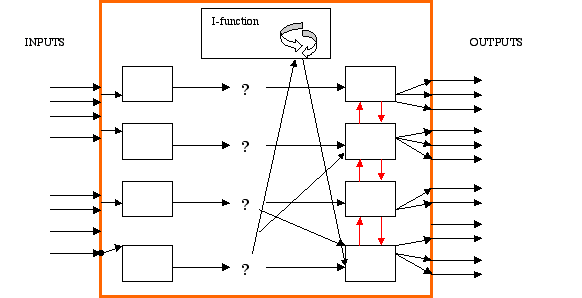
19 March
Have "rocks" - Central Pattern Generator - and connections among them (corollary discharge = efference copy)
CPG from genome/experience/combination - is interconnected neurons
Look at some more uses/implications of corollary discharge:
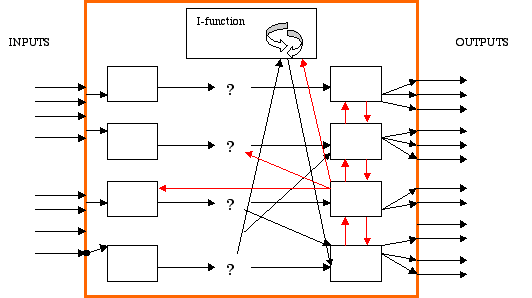
21 March
Let's now reinstate reafferent loop, see what new things that gets us
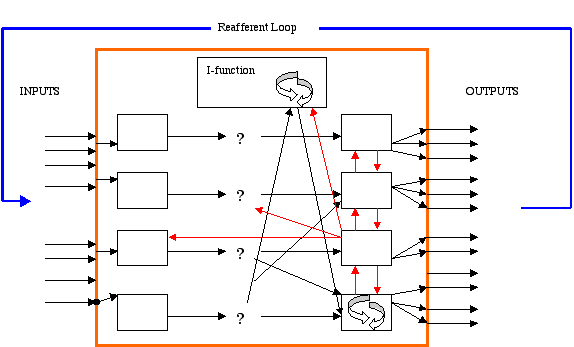
Stretch "reflex"
Not an input-output pathway but a feedback loop
26 March
|
I began to think about syndromes in which an individual experiences the chronic and persistent sensation of pain while no physical damage is present at the site of pain. Why are these pain receptors being activated? Furthermore, is there a signal that the brain erroneously interprets as real pain? ... Kelli
I am fascinated by the concept of phantom pain ... If the limb is absent, then the pain receptors from the limb are absent, so the sensation must come from the brain and not the limb. .... Beverly People whose vision has been impaired by cataracts or by the loss of a portion of the visual processing system in the brain sometimes report highly detailed visual experiences, similar to phantom limbs. Also, people who lose their hearing commonly report noises in their heads. Do these phantom phenomenon occur when the brain loses its normal input from a sensory system? ... Rebecca How is it that one can still feel where the position of their limb is if they don't have one? This is also true for those who weren't even born with one. This leads me to believe that we are all born with a few common "experiences" already in our brains ... So is this due to genetics? ... Asra
The disagreement causes motion sickness. But why is it that only certain people are prone to motion sickness, while others are not phased by it? ... Kathryn I found the topic about central pattern generators very interesting. As i was listening to the lecture during class, i realized how "generalized" we made the concept seem. It seems as if every person's motor activity would be the same, given similar motor coordinations of the motor neurons. Yet, what accounts for the differences in ability? ... Sook I seem to recall that in an earlier class we discussed the notion of the tremendous variability that can be found in human brains. How then, can we account for the sometimes astounding similarities we see in the thought patterns of different people? How would studies on cloned human beings affect our current understandings? When the "parts" are the same, what does this really mean in practical terms? ... Gavin I am fascinated by the concept of phantom pain. It is especially interesting when considering the fact that anyone who has lost a limb obviously knows, consciously, that they no longer have that particular appendage. They are aware of it ... there is no way for us to consciously tell our brains that we are not feeling pain, that there is no limb there, and that the unpleasant sensations should cease .... Yasmin I think what fascinates me the most is the fact that I never really thought of choices to be so detailed, in that it relates to signals, such minute things compared to the human body as a whole. This discussion has made me think about choices in a different aspect. A choice is not constricted to whether you're going to order chinese takeout or pizza. It goes all the way to signals and the inhibitions of signals. ... Balpreet The interesting part about corollary discharge in my opinion, is that the circuits not only make sense of expectation and perception, but they make sense of choice without bringing in the I-function ... if the central pattern generator is activated by the I-function, how can the body react before the I-function is aware of it? .... Cass I would be interested in discussing what is choice now that we have changed some experiences that we thought were choice as corollary discharge. I am intrigued by the elimination of the I-function in this concept. ,,,, Gabrielle The corollary discharge patterns and reafferent loops may explain much of what appears to be either conscious or random behavior [why is it so often so easy to confuse those two??], but it explains them by explaining them away. Are we really moving toward the position that their is neither choice nor randomness in behavior? .... Hilary ... choice can account for the behavior that we observe in an organism, but that it cannot account for the experience that we believe that the organism is having. It is that one comment that I took away with me on Thursday. I must admit seeing that comment as being applicable to much more than just the case of our nudibranch mollusk. On a continuing note I ask (and realize that this question may not have an answer)what does account for experience? And are we the only ones who can define our own experiences? .... Sujatha the example of the Pleurobranchea made me feel like we were right back where we started at the beginning of the semester, since we still can't predict what the animal will do. It makes me wonder how much we can know for certain about the workings of the nervous system, especially the "I-function" and the whole concept of experience? How do we know whether we really experience things? How do we know what other organisms are capable of experiencing? .... Amy Interesting that observations on/thinking about basics of "output side" raises issues of variability, of nature of "choice", of perception, of distinction/relation between doing and being aware of doing? ... PG "I am coming more and more to the conviction that the rudiments of every behavioral mechanism will be found far down in the evolutionary scale and also represented in primitive activities of the nervous system" ... Karl Lashley, "The Problem of Serial Order in Behavior", 1951 |
Many more boxes/tracts relevant to output side of nervous system
Cerebellum, basal ganglia as "loops"
Focus on motor cortex
Recapitulation:
 |  |
Lessons learned "from the output side":
28 March Expectations of what will be learned "from the input side"?
Recall "labelled line" - see lightening, hear thunder because different neurons activated, send action potentials to different places
Vision as a paradigmatic case (is it? ... is at least best studied, and shows some general principals)
2 April
|
The brain has many ways of doing the same things, and some of these don't reach the "I" function. ... the "I" function is a small piece of the nervous system and perhaps we don't use it as much for everyday activities as I thought we did. .... Kate
I have started to notice how much I do without consciously choosing each step of the behavior. It is very interesting .... Shannon the I-function of the brain does not come into play nearly as often as I had previously supposed. It makes changes in actions when necessary, but many of the actions themselves are performed through subconscious channels like muscle memory. .... Sarah My question about this is, if the presence of a motor cortex correlates with the capability to make voluntary movements, then does that mean the I-function is located in the motor cortex? .... Aly Do all species have an "I-Function"? Can we even show that they have an "I-Function"? ... Rebecca In a scientific context, does biofeedback prove that the I-function can indeed alter the body? Does this support mind-over-matter to a greater degree than we previously acknowledged? .... Kelli I feel like we are slowly taking away peices of the I-function that we thought were significant parts, such as choice. This bothers me a little bit. .... Gabrielle It seems to me that the idea of the I-function developed in response to a recognition that we are not in total control of our actions and behaviors at every moment in time. With the I-function defined as a separate it as a distinct entity, we can explain a range of behaviors. It seems that views about many issues in contemporary society (ethics, social responsibility, etc.) can be heavily influenced by conceptions of the I-function and human agency. .... Gavin Our recent discussions of sensory perception have raised several questions in my mind. In particular, if the only way that we know the world around is through sensory perception, then does an external reality exist outside of our brain? .... Priya I think the insight that experience is subjective has a critical but distinctly limited utility in scientific inquiry: keeping it in mind keeps us honest and accurate as we observe and analyze behavior, but keeping it always at the forefront of our minds would leave us paralyzed and unable to pursue any scientific inquiry based on [more or less] objective observations. .... Hilary |
"Imaging" - essential role of non-neural structures
Picture on retina and picture in head very different
8 April
|
This whole discussion reminds me of the movie, The Matrix ... T
Philosophy has often been discussed in my college seminar course. During one particular class period, a heated debate began that I feel is relevant to the discussion we are having now. The question came about as to whether or not we could be sure we perceived the world as it actually was and if indeed we could even assume that we all perceived the world in the same manner. During this class, I thought this question was rather silly ... However, after sitting in class on Tuesday and Thursday, I realize the question is not as simple as I thought it before ... if everyone's brains work a little bit differently, then it would make sense that we would all perceive things in a slightly different manner. If this be the case, then the question whether you see my "pink" as "purple" and vice versa, is not too far fetched after all! ... Aly I think it is a very interesting idea that the images that we percieve as reality are images on our brain, not our eye. Because of the variation in experiences and our differing biologies ..., none of our brains are exactly the same. Thus it seems that no two people would percieve the images of the world exatly the same ... Miranda Every person has their own distinct view of the world --so in that sense the brain does contain the "sky and you besides." A painting can mean different things to different people, it depends on the individual perception of the painting ... Erica hey, what ARE babies aware of anyways, so that is kind of a bad question - but an interesting thought. I was also thinking if there was possibly any situations where people did not correctly/adequately go through the process of learning to see? ... Lauren In any case, it appears that the brain is not always able to work out which information is true, and which is false. What role does the I-function play in this; is it aware of this crossing of wires? It would be interesting to know how the brains of the sight-deprived monkeys interpret the sudden influx of data when the researchers open the second eye ... Sarah
The brain lies for the mind's own good, I think, but why/how do some stimuli result in conscious experience and others do not, even when it is critical to the organism's survival that the nervous system be acutely sensitive to these stimuli? ... Does that mean that our reality comes from some neurons firing in a certain pattern? What happens if this is damaged, does the person have warped sense of reality? ... Cass How does dreaming relate to seeing? ...The question of reality has to play a factor. What exactly does reality mean? ... Rebecca After discussing the relationship between vision and "I" function, I began to think about other situations in which what we see is not what is really there. Specifically, I am curious about how hallucenogenic drugs affect the nervous system ... Peffin However, it seems that most of the time we do not compare in detail with other people what exactly we are seeing, so perhaps we are not fully aware of how differently we are actually seeing things. The notion that we think differently seems so much more natural to us. Indeed, seeing things the same, or almost the same is essential for daily activities like driving. The assumption is that we are all having the same experience. Yet is this always the case? Perhaps we are seeing things similarly enough for there not to be major accidents at every turn, but are we actually having the same visual experience? If our nervous systems all share the same organization, then why don't we as humans always feel the same or think the same about a certain issue? Perhaps we just find it unsettling to think that we may be having different visual experiences when we think they are the same ... Gavin I also have another question, that I have thought about for many years. Does everyone see colors the same? I wonder if pink looks the same to you as it does to me, besides those who are color-blind. If colors didn't look the same that would explain people who can't match colors well ... Gabrielle PG: two related questions
|
This is not yellow |
or
Is color an aspect of physical "reality" or "made up" by the nervous system?
Physical "reality"
Have brightness, color, need third dimension?
| Binocular stereopsis resolving conflict | But ... creating ambiguity |
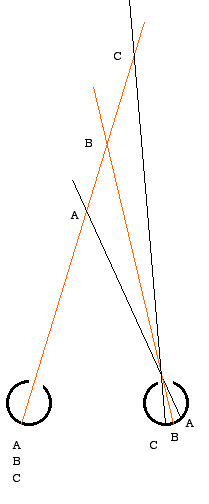 | 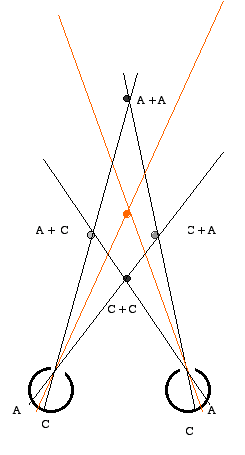 |
Ambiguity as fundamental in seeing, sensory systems generally
|
it appears that the brain is not always able to work out which information is true, and which is false ... Sarah
What exactly does reality mean? ... How do we really make sense of what goes on out there? What about hallucinations? "Believe only half of what you see, and nothing of what you hear." What do we think about that statement? ... Rebecca What is reality? This may seem like a rather abstract question, yet, as i was thinking about this, i realized that reality may really not be REAL after all ... Sook We have all had the experience of seeing something out of the corner of our eye that when we turn and look just is not there anymore. It is just to what extreme these visual hallucinations take place that deciphers whether one is "crazy" or just slightly paranoid ... Michelle The part that I find especially intriguing is that even though we now know about our blind spot, we can't make ourselves see it. This provides even more support for the encapsulated "I" function theory. It almost seems as if our brains are trying to protect the "I" function from the complexities of the reality of the world around us ... Kathryn |
Reality always an hypothesis, checked and rechecked ... ?
Next problem - how does nervous system create? fill in, add color, add depth?
Where IS "picture in head"?
Multiple ganglion cell types - more - multiple samples
Retinal projections ... another ... another
Blindsight and its implications
The story of the frog ... getting it less wrong without neocortex
23 April
|
Now that my world has been turned upside down in class, I need to recompose myself. I don't know how everyone else feels about our class discussions lately, but I feel as if I am slowly losing faith in everything that was previously so sure in my life. I always figured everyone's realities were all the same...after all isn't what we see in our heads a representation of how the world actually is?
...
Ok....so now, not only are we are at the mercy of our sensory equipment, but we are at the mercy of how our brain puts this input together? And apparently, this picture is just a representation for the I-function so that we can invision ourselves in this reality? The fact that we can "see" without having this picture in our head, puts me in a state of awe. I can not fathom how it would feel to not see a picture, but still see. I guess this is because my I-function is still functioning, and I could not experience the reality of a person like this, unless my I-function did not work.
...
It is interesting to contemplate what actually exists in the world and if there will ever be a way to know what truly exists out there. At the same time, maybe reality is just a subjective thing. Maybe the only way it can be defined is through us, and because we all have different realities, there can be no "truth". ... Aly
Thus, our reality is a hypothesis based on the best presumption and good guess of our brain. If each person's reality is a hypothesis, what is the effect this would have on behaviour. How many of our attitudes and perceptions are indeed result of the hypothesis of our brain. And in conflict situations, how often it is about the oppositions of these same attitudes and perceptions, while the roots of many of these problems may well be in the ability to guess of the individual brains. I am thinkin along the lines of the social sciences and what consequence this could have in terms of conflict management, for example. The realization that differences are often times just the result of brains' different ways of filling the gaps ... Kornelia I would like to respond to Aly's previous post about the notion of objective reality. Postmodern theorists make the frightening assertion that objective reality simply does not exist. According to this theory, there are no absolutes and no universals ... Roland Barthes, in his critical article "The Death of the Author" argues that intentionality is irrecoverable. He suggests that a given work of literature has no absolute meaning, and that there is no use in attempting to uncover what the author meant, because his interpretation is equally unreliable. The author is born simultaneously with the text ... According to Barthes assertions, we cannot rely on anything to understand reality. If we think of a text as a form of reality, even its creator has no ownership or understanding of its meaning. We are all simply adrift in a void of meaninglessness. I find this idea very unsettling, and even more so because it is difficult to counter such a viewpoint when one's argument can be easily deconstructed as well ... Gavin it is interesting to transpose our knowledge to conflict situations in the news currently. ... is the inability to resolve political strife at core an intersection of conflicted realities? Are there no means of reconciling these differences, leaving us with a grim, conflict ridden future? ... Jenny we see the world from the culmination of all of our experiences thus far. Because our experiences are constantly changing, our brains' frame of reference is constantly in flux as well. So no one is really stable and stagnant in his/her perception of reality because the point from which one views reality is always revising itself. ... Tua "Reality" as social construct, through negotiation of individual "realities"? Always subject to updating? Science=brain="getting it less wrong"? ... PG But what if we dream of something that we have never experienced before (eg: flying, being in space). If we do not have a collection of memories for that particular experience, where would those visions come from? ... Balpreet it seems our minds have an uncanny ability to create. It can take output and create new input. ... Joan
|
"Generalized control mechanisms" -> emotion -> personality

Sleep/wake
30 April
|
With what time we have left, I'd be interested in discussing creativity: it seems to me solid evidence of the infinite variability of brains and of the ultimately subjective and ever-shifting nature of perception, but how do different brains produce different creative output? ... I think discussions of forensic issues in scientific settings are somewhat akin to discussions of scientific issues in forensic settings -- like penguins dancing Swan Lake: oddly captivating but not pretty. How to bring the two fields togetherin a productive way for both disciplines and for society as a whole is a never ending struggle. Yet multidisciplinary approaches to these issues so often sacrifice rigor and depth for accessibility and breadth. How to get the legal system and the scientific community talking in some productive fashion?? ... Hilary I'm also interested in exploring the individual differences among people and what accounts for them. How is it that some of us come to act in a socially appropriate way and others are given a label such as Conduct Disorder? It seems like we have a good model here, but I think it would be interesting to explore how people deviate from that model and why they deviate. ,,, Mary Is it possible that one's perceptions and memories are merely summaries of experiences, waiting to be replaced by newer summaries? ... Sook maybe we could work throught our own understanding about how personality and creativity are accounted for my the central nervous system. Also, I have always wondered about the impact of genetics versus environment. ... Tara What I want to know is what exactly is included in the "I" function? How accountable are we for our actions? How much control do we have over how we see the world? ... Kathryn Throughout the semester, the discussion of brain and behavior has raised some serious accountability questions for me. It appears that thus far, we have been able to attribute the majority of actions and behavior to the brain. However, with the mention of the Tate trial in another post, does that hold water in most real life situations? Where the insanity defense is concerned, is that a legitimate excuse for illegal action, if in nother situations that defense would be absurd. I'm just concerned with the brain and our legal system. How far can we use the brain as an excuse? In our class, very far. But if we would translate that to the real world, our entire legal and penal system would be turned on its head. Is there a way to merge the truth (yes, you did wrong because of a malfunction in your brain) with practicality (but we still must try you as a person who broke the law)? ... Jenny How does one know when someone is mentally competent? How can one's mental state really be evaluated? What is exactly happening in the brain to cause someone to act that way? Are we ever fully aware of what we are actually doing? ... Rebecca I would like to see more exploration into learning and memory. How exactly does the brain store memories and how do we indeed "learn" knowledge? Learning disorders are very common and, like emotions and other things, can help to define how others view a person. I question how different learning capabilites affect people's perceived realities. While sitting through class, we have learned many things about brain and behavior, but we have not studied the main thing that our brains do: learn. I think that learning is the missing piece of the puzzle. ... Aly I think that a discussion on learning would be a good one. I think I know a lot more about the brain than I did at the beginning of the class. But, many times the more that I know, the more I feel like I don't know. That has definitely been my experience in this class. Each subject we have covered has made me question and want to know more. Spending some time making a summary of what we learned might help bring it to a conclusion. There are scientists that spend their whole lives studying the brain without completion, so I think that we may have to do it to. ... Gabrielle |
The I-function
30 April
| After a semester of convincing, it seems clear to me that free will does not exist ... Miranda |
Emotion and "personality"

|
The Brain - is wider than the Sky - For - put them side by side - The one the other will contain With ease - and You - beside-
The Brain is deeper than the sea -
The Brain is just the weight of God - | 
|
|
Trust where you are at any given time Learn Explore Dream Choose
And repeat, over and over and over again | 
|
| There are scientists who spend their whole lives studying the brain ... so I think we may have to do it too ... Gabrielle |